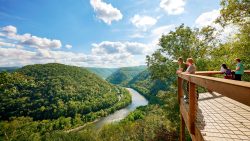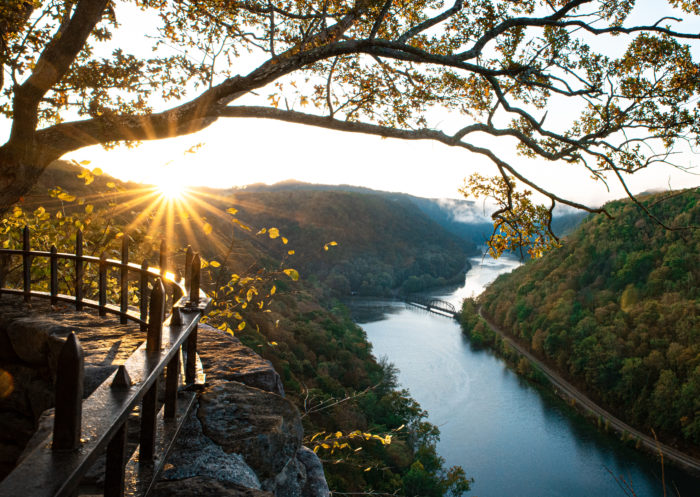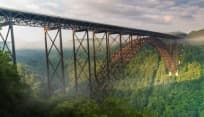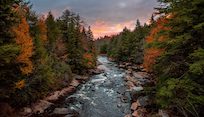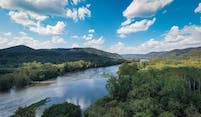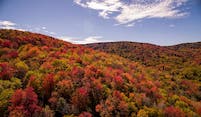How would you have fared on the wild frontier?
Every so often, whether you’re camping out in the woods, suddenly without cell reception, or even if there’s a cable outage, it might dawn on you that we rely upon a LOT of modern conveniences.
Needless to say, our ancestors in the 18th and 19th centuries didn’t need electricity, 4G coverage or internal combustion engines. Especially in places like the Appalachian frontier of 200 years ago, settlers had to be self-sufficient and skilled in a variety of ways to survive.
How would you have fared if you were suddenly transported back to colonial Western Virginia?
Take this quiz to add up your backcountry know-how, and to find out how you can hone your frontier survival skills.
1. Have you been on a “long hunt?”
Many of us know how to hunt, and many of us know how to backpack along remote trails in Appalachia. But have you ever done both at the same time?
Explorers and settlers in the mid-1700s proudly called themselves “longhuntsman.” They were used to walking dozens of miles a day, sleeping on the ground and always being on the lookout for deer and other animals to harvest for their meat and fur.
2. Can you build a fire without matches or a lighter— in all weather?
Usually, the times that you need an emergency fire for warmth are the precise times that they are most difficult to make: when it’s windy, cold and wet.
This is challenge enough if you have a book of matches or a lighter. But have you ever successfully started a fire with a glass lens, flint and steel, or even an Indian-styled bow drill? This is truly varsity-level survival!
3. Can you catch a fish?
Fishing is a more accessible skill than hunting for most of us, and in backcountry survival it was one of the easiest and fastest ways to get protein. But there’s a difference between fly-fishing with all those fancy rods, reels and flies, and survival fishing where you forage for your own bait and just use bare essentials like string and wire to make a fishing pole.
4. Can you forge in a smithery?
Metalworking was one of the most valuable skills that frontier villagers could have. Most Native American groups never learned how to forge metal, so the skill gave colonists a “leg up” in making farm implements, blades, bullets and all sorts of repairs.
Have you ever pumped the bellows on a forge, hammered something out on the anvil and produced something metal?
5. Do you know how to forage for wild mushrooms and berries?
West Virginia’s forests are overflowing with little nourishing goodies that you can eat. But you’ll need some serious identification skills. Do you know which berries are edible? Can you tell a deathcap mushroom from a chanterelle?
6. Could you trap an animal?
It’s more involved than fishing, but less so than taking down a deer. Trapping on the frontier was key to catching small amounts of meat, and gathering fur pelts that you could use or sell. And plenty of West Virginians today still trap “varmints” for regional Appalachian dishes like possum or squirrel gravy!
7. Do you know how to sheer sheep, properly?
Even with today’s synthetic fabrics like nylon or polypropylene, wool still holds its own. It’s warm, durable and– unlike cotton– will keep you insulated even when it is wet.
Frontier settlers knew this, and wool was an essential part of their cold-weather wardrobe. Can you produce wool at every step, from shearing a sheep, to spinning thread, to knitting or weaving fabric?
8. Can you milk a cow?
Milk was a reliable, steady source of protein and calcium for settlers. And if they churned into butter, it could even last a fair amount of time in cellar larders or creameries.
9. Do you know how to raise chickens?
As a source of both meat and eggs, chicken raising is one of the less involved ways to get into farming and self-sufficiency; even some suburban- and urban-dwellers around the country have begun raising chickens in their backyards. Not to mention, fresh eggs are extra tasty. Have you ever raised your own chickens?
10. Have you cooked over an open fire?
Dutch-oven baking, slow-roasting or smoking meat, tinfoil dinners– there are several ways you can cook tasty meals without using a camping stove, let alone a kitchen range. But do you know how to cook or bake with just coals and an open hearth?
11. Can you make your own candles?
Candles were essential light sources for backcountry colonists, and they’re not complicated to make. All you need are woven cotton wicks and some tallow or wax.
12. Can you harvest timber with a team of horses?
For frontier homesteaders in Appalachia, clearing woods was paramount. It opened up farming land, and provided timber for building permanent, cozy log cabins.
Today, most logging is done on a commercial level, with chainsaws, bulldozers and trucks. But some loggers and foresters still do things the old way, with non-motorized saws and teams of draft horses to haul trees off. Could you?
***
Scores:
Okay, add up your scores! 1 point for every one of the skills that you’ve got.
8-11 pts: What are you doing on your computer? You are a true backcountry survivalist, and would have had no problem staking your homestead claim on the wild frontier.
4-7 pts: You’ve got some serious survival skills. We’d definitely want you around if we get stranded. But you’re still better suited for a long backpacking trip than any Bear Grylls/Revenant kind of stuff!
0-4 pts: You’re off to a good start for a weekend camping trip, but you might want to brush up on some self-sufficiency skills before you cross that Cumberland divide into the Far Frontier.
***
Improve your results!
Now, if your frontier know-how score was anywhere less than Daniel Boone’s, don’t despair! There are plenty of workshops and seminars around West Virginia state parks and historical associations that still teach these skills.
Prickett’s Fort State Park (Fairmont)
This state park has workshops on fishing, longhunting, hearth cooking, blacksmithing, antique firearms and sheep shearing.
Wild Rose Soap Company (Shepherdstown)
You can occasionally take homemade candlemaking and soapmaking classes at this all-natural shop.
Heritage Farm Museum (Huntington)
This living history museum has classes and events on bare-bones survival skills like blacksmithing, cast iron cooking, and glass and ceramic firing, as well as more folklore skills like frontier music and storytelling.
Jackson’s Mill Historic Farmstead (Weston)
This farmstead has seminars on woodworking, basket weaving, paper marbling, blacksmithing, and other frontier arts. Learn all the old-school survival skills!
Nature Wonder Wild Food Weekend (Cairo)
Every September, this festival celebrates Mountain State wild foods with cooking contests, expert speakers and guided hikes that focus on berry and mushroom identification.
What was your score? And which skills will you be learning next?
This post was last updated on July 22, 2020
